PRINCETON, NJ -- Nearly six in 10 Americans believe that high-ranking IRS officials in Washington were aware the IRS had a practice of targeting conservative political groups for greater scrutiny in recent years. One-quarter think knowledge of this was mainly limited to the agency's office in Cincinnati where the mishandled applications for tax-exempt status were processed.
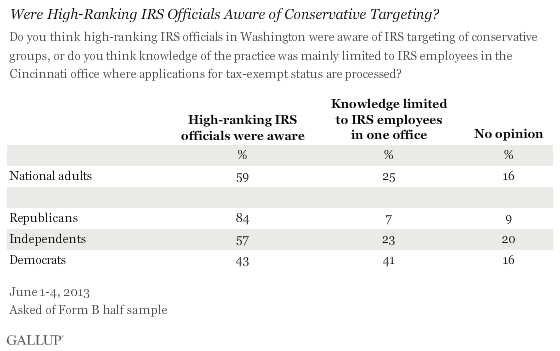
These findings are from a June 1-4 Gallup poll of 1,529 national adults. Gallup asked half of the respondents if they think IRS officials were aware of the partisan targeting, and separately asked the other half of respondents about whether high-ranking Obama administration officials were aware of the practice.
Half of Americans believe top administration officials were in the know, slightly less than the 59% saying this of IRS leadership. However, in both cases relatively few Americans believe knowledge was limited to the branch office in Cincinnati.
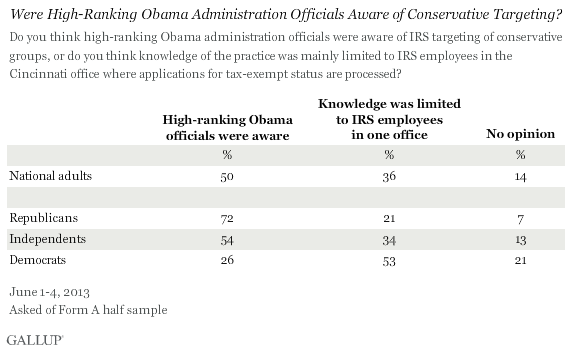
More than seven in 10 Republicans believe that top leaders in the Obama administration (72%), as well as at the IRS (84%), were aware that conservative groups' applications for tax-exempt status were targeted for greater scrutiny. Just over half of independents also hold these views. By contrast, the slight majority of Democrats, 53%, believe Obama administration officials were not aware of the practice, while they are evenly split on whether high-ranking IRS officials were aware.
Majority Disapproves of Obama's Handling of IRS Matter
Apart from what Americans think about President Barack Obama's direct role in the IRS matter, 58% disapprove of the way he has handled the situation. Thirty-two percent of Americans approve, well below his 47% overall job approval rating in the same poll.
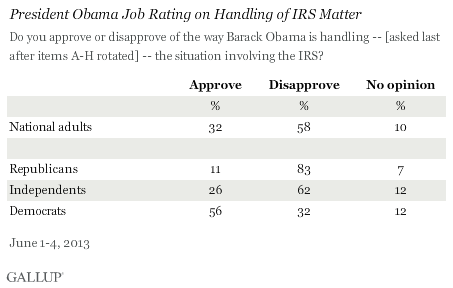
One potential reason Obama's overall job rating hasn't turned negative in the wake of the controversy could be that the large majority in the U.S. has yet to see the issue as highly serious. Although a combined 77% of Americans consider the matter serious, 49% call it "very serious," while another 28% deem it "somewhat serious."
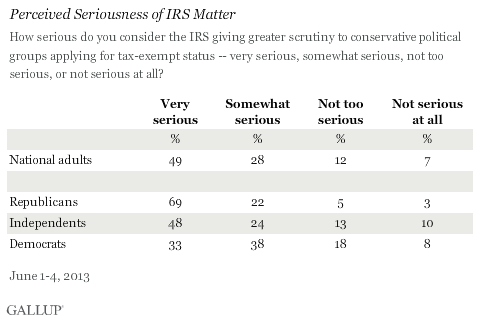
Additionally, Americans are paying slightly less than average attention to news about the IRS matter, with 20% saying they are following it "very closely," 34% "somewhat closely," and 21% "not at all." The combined 54% paying close attention compares with 60% for over 200 news stories Gallup has rated since 1991.
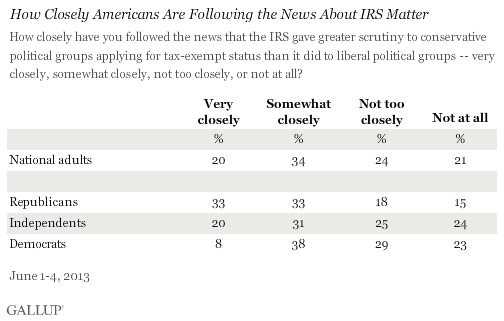
Nearly Half Consider Administration Ethics Subpar
The same poll finds Americans divided in their overall views of the ethical standards of top Obama administration officials. Fifty percent rate them "excellent" or "good;" 49% say they are "not good" or "poor." The 32% specifically calling administration officials' ethical standards poor is higher than Gallup found toward top officials in former President George W. Bush's administration between 2002 and 2005, as well as in Bill Clinton's administration in 1994.
Differences in survey methodology in terms of question order could mean the results may not be entirely comparable from one survey to the next. Nevertheless, even taken by themselves, the current results are not optimal for an administration that has prided itself on having put in place "the toughest ethics laws and toughest transparency rules of any administration in history."
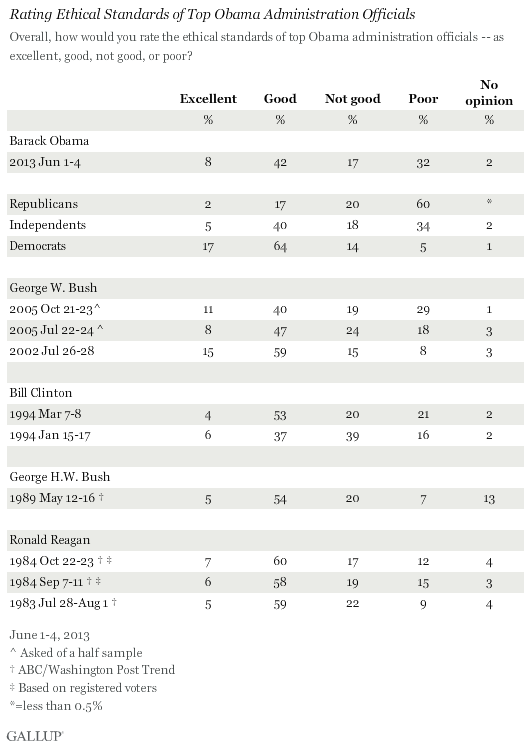
Bottom Line
Americans generally see the targeting of conservative groups by the IRS as a serious problem, and they don't believe it was merely a function of rogue behavior at the local IRS branch responsible for processing the applications, but something top-ranking officials at the IRS or within the Obama administration were aware of. Importantly, independents join Republicans in expressing these concerns.
How damaging this will be for President Obama is still unclear, however. On the one hand, his overall job approval rating continues to register well above his rating on the IRS matter, suggesting that other issues matter more to Americans. On the other, his job approval rating has generally been below 50% in recent months, amid a swirl of controversies that relate to ethical standards within his administration. Perhaps the best barometer of how much all of this is directly affecting Obama is Americans' negative ratings of his administration's ethics. Right now respondents are split evenly between positive and negative. However, should they tip into solidly negative territory, possibly following increased public attention to the IRS story if the controversy mounts, his job approval may turn negative as well.
Survey Methods
Results for this Gallup poll are based on telephone interviews conducted June 1-4, 2013, with a random sample of 1,529 adults, aged 18 and older, living in all 50 U.S. states and the District of Columbia.
For results based on the total sample of national adults, one can say with 95% confidence that the maximum margin of sampling error is ±3 percentage points.
For results based on the samples of 755 national adults in Form A and 774 national adults in Form B, the margin of sampling error is ±4 percentage points.
Interviews are conducted with respondents on landline telephones and cellular phones, with interviews conducted in Spanish for respondents who are primarily Spanish-speaking. Each sample includes a minimum quota of 50% cell phone respondents and 50% landline respondents, with additional minimum quotas by region. Landline telephone numbers are chosen at random among listed telephone numbers. Cell phones numbers are selected using random digit dial methods. Landline respondents are chosen at random within each household on the basis of which member had the most recent birthday.
Samples are weighted to correct for unequal selection probability, non-response, and double coverage of landline and cell users in the two sampling frames. They are also weighted to match the national demographics of gender, age, race, Hispanic ethnicity, education, region, population density, and phone status (cell phone-only/landline only/both, cell phone mostly, and having an unlisted landline number). Demographic weighting targets are based on the March 2012 Current Population Survey figures for the aged 18 and older U.S. population. Phone status targets are based on the July-December 2011 National Health Interview Survey. Population density targets are based on the 2010 census. All reported margins of sampling error include the computed design effects for weighting.
In addition to sampling error, question wording and practical difficulties in conducting surveys can introduce error or bias into the findings of public opinion polls.
View methodology, full question results, and trend data.
For more details on Gallup's polling methodology, visit www.gallup.com.
